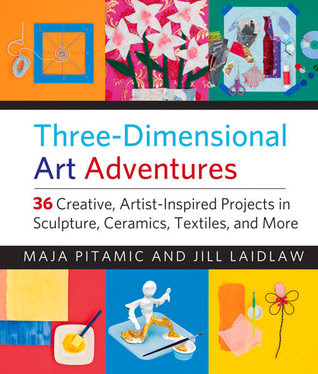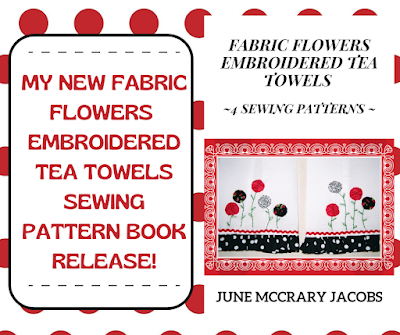~ MARVELOUS MIDDLE-GRADE
MONDAY S.T.E.A.M. FEATURE ~
-- THREE-DIMENSIONAL ART
ADVENTURES --
AUTHORS MAJA PITAMIC & JILL LAIDLAW
MONDAY S.T.E.A.M. FEATURE ~
-- THREE-DIMENSIONAL ART
ADVENTURES --
AUTHORS MAJA PITAMIC & JILL LAIDLAW
LEARN MORE ON GOODREADS
- Weave a tapestry using yarn and a shoebox loom
- Use found and recycled materials to assemble a still-life collage
- Tie-dye a T-shirt using several pattern-creation techniques
- Design and build a shadow box on a personal theme
- Use modeling clay and pipe cleaners to create a spider sculpture
- Create a colorful flower arrangement using wire, tissue paper, and other materials
- Fold and cut paper, cardboard, and magazine photos to build an elaborate street scene
- Carve a portrait into a clay slab and paint the raised surfaces to enhance the image
- and 28 other engaging, hands-on projects.
Authors and educators Maja Pitamic and Jill Laidlaw also explore the stories and meanings behind 18 well-known works of three-dimensional art as inspiration for these kid-tested, exciting, and creative projects. No prior knowledge of three-dimensional art is required—just enthusiasm for the subject and a willingness to discover.
ABOUT THE BOOK {from Goodreads}:
Three-dimensional art is bold, tactile, and fun—in other
words, perfect for children who love to get their hands dirty.
Three-Dimensional Art Adventures introduces young artists, ages 6 and up, to groundbreaking masterpieces and fresh techniques, then lets them loose. Children will:
Three-Dimensional Art Adventures introduces young artists, ages 6 and up, to groundbreaking masterpieces and fresh techniques, then lets them loose. Children will:
- Weave a tapestry using yarn and a shoebox loom
- Use found and recycled materials to assemble a still-life collage
- Tie-dye a T-shirt using several pattern-creation techniques
- Design and build a shadow box on a personal theme
- Use modeling clay and pipe cleaners to create a spider sculpture
- Create a colorful flower arrangement using wire, tissue paper, and other materials
- Fold and cut paper, cardboard, and magazine photos to build an elaborate street scene
- Carve a portrait into a clay slab and paint the raised surfaces to enhance the image
- and 28 other engaging, hands-on projects.
Authors and educators Maja Pitamic and Jill Laidlaw also explore the stories and meanings behind 18 well-known works of three-dimensional art as inspiration for these kid-tested, exciting, and creative projects. No prior knowledge of three-dimensional art is required—just enthusiasm for the subject and a willingness to discover.
ABOUT THE AUTHORS {from the Publisher's website}:
MY REVIEW:
I found this book in the local library's online catalog when I searched for art books for children. It is part of a series published by Chicago Review Press.
After having read many art books for children over the years I found this book to be unique in one aspect. Within each chapter, these authors featured one or more piece of art and included details about when it was made and by whom, the significance of the artist and his/her style/accomplishments, and a 'what's the story?' blurb about the particular piece of art. In the back matter of the book an informative biography of each artist is included.
Six forms of art are covered in the book: Early Sculpture, Modern Sculpture, Installation Art, Ceramics, Collage, and Textiles. Basically, there is something for every reader to enjoy in this book.
As mentioned above, each chapter has several projects for children to make to practice the highlighted technique. The projects are colorful, appealing, and make use of easy-to-access materials. Some even use recyclable 'stuff' found around the house or classroom. The stepped-out instructions and photographs for each project are excellent and user friendly. Each project includes a 'Top Tip' in the sidebar with useful information such as, " . . . don't allow the clay to dry out, or you won't be able to . . . "
There is so much to admire about this book, but one of my favorite sections is the 'Woman with a Flowery Hat' spotlight on the ceramic piece created by Pablo Picasso in 1964. Here students will learn about why Picasso took a break from painting to begin working with clay during the summers beginning in 1946. Cubism is briefly introduced here and a broader explanation of the style is included in Picasso's biography in the back matter. His 'Woman with a Flowery Hat' was inspired by Greek Mythology--another subject of high interest to most middle-grade students.
Other outstanding projects include:
-- 'A Trick Hand' where readers are taught to draw three-dimensional objects to create an optical illusion.
-- 'Craft Storage Box' where learners are instructed how to use small cardboard boxes and tubes 'installed' within a shoebox or other small cardboard box to make a functional piece of art wherein they may store their art supplies.
-- 'Lilies in a Vase' in the 'Textiles' chapter encourages children to make a wall-hanging using felt, fabric, etc., to make a three-dimensional of flowers in a vase.
-- 'Cubist-Inspired Tapestry' teaches readers to make a simple loom using a shoebox lid and string. Directions are included on how to weave a tapestry in the Cubist style using scraps of yarn, fabric strips, ribbon, cellophane, etc.
The back matter also includes an in-depth Glossary, a list of Where to See the Art in this Book, and a list of Tools of the Trade with tips such as ". . . cover up in an old T-shirt or apron before things get messy."
Highly-recommended for art and classroom teachers, scout/youth group/child care leaders, and parents/grandparents who enjoy working on DIY projects with their youngsters. Also recommended for fans of art history and various art techniqes--such as I!
I found this book in the local library's online catalog when I searched for art books for children. It is part of a series published by Chicago Review Press.
After having read many art books for children over the years I found this book to be unique in one aspect. Within each chapter, these authors featured one or more piece of art and included details about when it was made and by whom, the significance of the artist and his/her style/accomplishments, and a 'what's the story?' blurb about the particular piece of art. In the back matter of the book an informative biography of each artist is included.
Six forms of art are covered in the book: Early Sculpture, Modern Sculpture, Installation Art, Ceramics, Collage, and Textiles. Basically, there is something for every reader to enjoy in this book.
As mentioned above, each chapter has several projects for children to make to practice the highlighted technique. The projects are colorful, appealing, and make use of easy-to-access materials. Some even use recyclable 'stuff' found around the house or classroom. The stepped-out instructions and photographs for each project are excellent and user friendly. Each project includes a 'Top Tip' in the sidebar with useful information such as, " . . . don't allow the clay to dry out, or you won't be able to . . . "
There is so much to admire about this book, but one of my favorite sections is the 'Woman with a Flowery Hat' spotlight on the ceramic piece created by Pablo Picasso in 1964. Here students will learn about why Picasso took a break from painting to begin working with clay during the summers beginning in 1946. Cubism is briefly introduced here and a broader explanation of the style is included in Picasso's biography in the back matter. His 'Woman with a Flowery Hat' was inspired by Greek Mythology--another subject of high interest to most middle-grade students.
Other outstanding projects include:
-- 'A Trick Hand' where readers are taught to draw three-dimensional objects to create an optical illusion.
-- 'Craft Storage Box' where learners are instructed how to use small cardboard boxes and tubes 'installed' within a shoebox or other small cardboard box to make a functional piece of art wherein they may store their art supplies.
-- 'Lilies in a Vase' in the 'Textiles' chapter encourages children to make a wall-hanging using felt, fabric, etc., to make a three-dimensional of flowers in a vase.
-- 'Cubist-Inspired Tapestry' teaches readers to make a simple loom using a shoebox lid and string. Directions are included on how to weave a tapestry in the Cubist style using scraps of yarn, fabric strips, ribbon, cellophane, etc.
The back matter also includes an in-depth Glossary, a list of Where to See the Art in this Book, and a list of Tools of the Trade with tips such as ". . . cover up in an old T-shirt or apron before things get messy."
Highly-recommended for art and classroom teachers, scout/youth group/child care leaders, and parents/grandparents who enjoy working on DIY projects with their youngsters. Also recommended for fans of art history and various art techniqes--such as I!





What a fantastic collection of fun projects. Perfect for home and at school. Thanks for sharing this excellent resource. I know several people who will want a copy.
ReplyDeleteThis sounds fantastic! I will definitely be looking for this one.
ReplyDeleteThis book sounds really fun! The information and projects sound fascinating. Thanks for the review!
ReplyDeleteI love books like this. This one sounds like it is particularly well designed. Thanks for the review.
ReplyDelete